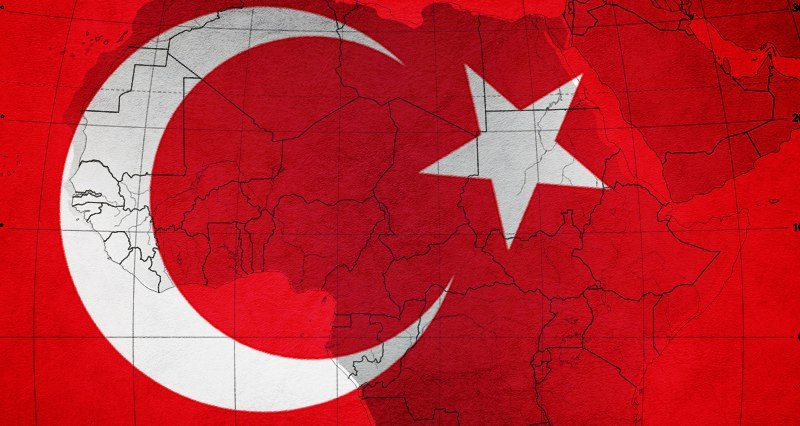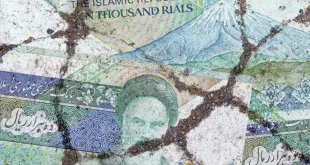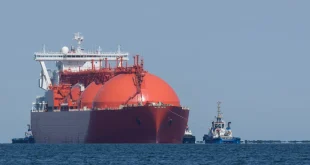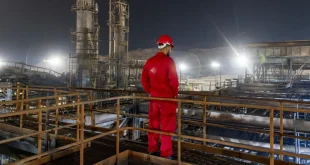Turkey, which has based its economic growth on export development and made significant strides in recent years (especially during the AKP administration) has taken a strategic approach to the African continent in search of new markets. Moreover, it is seeking to expand its political, economic and commercial presence on the continent. Turkey, as a country that has a positive outlook on globalization and seeks to develop strategies to optimize the use of the gains of the process to minimize its consequences, has made extensive efforts to diversify relations in recent years. Experts attribute Ankara’s approach to the African continent to several important factors, including “the existence of Turkey’s historical and traditional relations with North African countries on the southern coast of the Mediterranean.”
TURKISH FOREIGN POLICY AND AFRICA
Turkey has been trying to increase its share of economic and trade relations with Africa since the beginning of its relationship with African countries. For the past five years, Turkey, along with Brazil, China and India, has been one of the four non-African countries with the largest presence on the continent. Turkey has made exports amounting to $11.5 billion to the African continent during the first nine months of this year. Industrial products account for the largest share of Turkish exports to African countries. According to the data released by the Turkish Census Bureau, the volume of trade between Turkey and the African countries also increased by 14,1% compared to that of the previous year.
In October 2017, the Turkish ambassador to South Africa announced the opening of new Turkish embassies in Swaziland and Lesotho as part of the country’s policies to expand Turkey’s presence in Africa. According to Elif Çomoğlu Ülgen, Turkey’s ambassador to South Africa, in line with the expansion of Turkey’s foreign policy priorities in the African continent, the Turkish government has also decided to open more embassies across the continent hoping strengthening diplomatic and economic cooperation between Turkey and African countries.
TURKISH ECONOMIC DIPLOMACY IN AFRICA
Turkey is defining its political, cultural and scientific strategies for effective economic presence in Africa and pursuing its activities in each area efficiently. In this context, before Turkish economic diplomacy in Africa was activated, cultural diplomacy was initially established in the form of humanitarian aid, Turkish language education and health care on the continent. The Turkish Cooperation and Coordination Agency (TIKA), the Education Foundation, the Red Crescent, the Turkish Youth Foundation and the Yunus Emre Cultural Institute have been the most active humanitarian and cultural diplomacy agencies on the African continent in recent years.
INCREASE OF INVESTMENTS IN AFRICA
By 2019, Turkey had exported industrial and other products amounting to $11.5 billion to Africa. Industrial products account for the largest share of Turkish exports to African countries. According to data released by the Turkish Statistical Institute (TÜİK), trade volume between Turkey and African countries also increased by 11% at the end of 2018, in contrast to the year 2017. The focus is now on enhancing the continent’s industrialization and development and launching new manufacturing industries on the free market across the continent. Turkish businessmen are investing in African countries with government support. Turkish businessmen should carefully examine the industry data of the past 10 years of the countries in which they intend to invest, including their banking system and rate of return. In this way, they will invest wisely and avoid loss of capital.
AFRICAN ENERGY RESOURCES AND TURKEY ENERGY SECURITY
Turkey meets more than 90% of its oil and gas consumption needs from foreign sources. Iran and Azerbaijan are the major suppliers of natural gas to Russia; Iraq and Iran are major oil suppliers to Turkey. Turkey imports from Africa both oil and LNG, while African countries play a role in Turkey’s energy security.
NIGERIA
Relations between Turkey and Nigeria are based on a commerce agreement signed in 1982 and the total volume of commerce between the two countries in 2019 amounted to $2.3 billion. Within the scope of the “Turkey-Nigeria Work Forum,” organized by the Foreign Economic Relations Board, Ruhsar Pekcan, the Minister of Commerce, arranged a visit to Nigeria on 13-14th January to develop economic relations between the two countries, putting Nigeria on Turkey’s agenda. Nigeria is Turkey’s 6th greatest commerce partner in the African continent and 2nd in Sub-Saharan Africa after the Republic of South Africa.
The 1982 agreement was signed in Lagos, the old capital city of Nigeria. Within the scope of this agreement, it was decided that Turkey would import products such as cocoa, cola nut and fruit, as well as rubber, palm walnut, tinstone, metal, zinc, crude oil and coal from Nigeria, while Nigeria would import various products ranging from construction materials and electronic products to agricultural tools. According to the data reported by the Turkish Statistical Institute, without counting oil and natural gas, the volume of commerce between the two countries in 2018 amounted to approximately $500 million, $340 million of which constituted Turkey’s exports to Nigeria, and $160 million of which was yielded by Nigeria’s exports to Turkey.
LNG IMPORTS FROM NIGERIA
Turkey’s import of Nigerian liquid natural gas (LNG) as of 1999 and oil as of 2019 has an important place in the economic relations between the two countries. The total volume of commerce of the two countries reached $2.3 billion in the year 2019. Today, oil and LNG constitute approximately 90% of Turkey’s imports from Nigeria, while the remaining 10% is comprised of products such as oily seed, fruit, sesame, wood coal and cocoa.
Nigeria, located in the western region of Africa, is among the countries which possess the most important oil and natural gas reserves. Nigeria, which became a member of OPEC in 1971, draws a lot of attention as a result of it being among the top 10 countries in the world in terms of oil reserves. Nigeria ranks 9th in the world with its more than 5 trillion-meter square natural gas reserves, and is a main provider (after Algeria) of natural gas to Turkey. According to data from 2015, Nigeria had 5.1 trillion-square meters of natural gas reserves but can only produce 50.1-billion-square meters. In 2018, Nigeria was ranked 4th in the world (following Qatar, Australia, and Malaysia) with its 27.5-billion-meter square of LNG exports.
ALGERIA
Turkey imported 2.94 bcm LNG from Algeria – a 37% increase from 2.15 bcm from the first half of 2018. The rise in Algerian LNG imports essentially compensated for the fall in volumes of Qatari gas imports. Turkey and Algeria signed an agreement to extend the existing natural gas provision agreement for another 5 years. Sonatrach, Algeria’s national state oil company, announced that it signed the agreement extending the current natural gas provision agreement with BOTAŞ until the year 2024. Algeria, which is Turkey’s 4th greatest gas exporter, provides 38% of Turkey’s LNG imports. The two countries also made an agreement to establish a petrochemical site in Adana with an investment worth $1.4 billion.
LIBYA
Turkey’s economic relations with Libya go back for many years. Aside from imports and exports, Turkish construction companies have signed numerous and high-volume contracts in Libya ranging from housing and commerce centers to highway construction. Turkish construction companies, which initially started to operate in Libya in 1972, undertook 124 projects yielding $7.6 billion in the years 2009 and 2010 before Muammar Gaddafi was overthrown.
According to Mithat Yenigün, the Chairman of the Turkish Contractors Association Board, the total value of the incomplete projects of companies operating in Libya was $19 million. Progress billing of completed work was around $1 billion, warranty totaled $1.7 billion and machinery and equipment amounted to approximately $1.3 billion. Companies are continuing to pay $50 million for the warranty letters. Turkish Petroleum Association’s (TPAO) petrol seeking activities in Libya started in the year 2000. TPAO, which invested more than $180 million in the country, discovered a new petrol reserve in Fezzan, but could not initiate production owing to unrest in the country.
SOMALIA
Somalia plays a major role in Turkey’s macroeconomic and economic development policies because of its long borders with the Gulf of Aden and the Indian Ocean and the potential role it could play in communicating with foreign countries to East Africa. Somalia’s importance in Turkish foreign policy is a result of its strategic position as well as its consumer market, which could add to Ankara’s economic and political potential in the Middle East region and the African continent. Due to its coastal borders with the Gulf of Aden and the Indian Ocean and the strategic strait of the Bab el-Mandeb, which is the point between the Gulf of Aden and the Red Sea, it has a special place in the strategic policies of many countries. Somalia’s strategic position was elevated after the opening of the Suez Canal, which connected the Mediterranean Sea through the Red Sea and the Aden Strait to the Indian Ocean.
Turkey has made large investments in the areas of education and health, which government officials have said to be essential. The most modern hospital in Mogadishu is Recep Tayyip Erdogan Hospital, made by Turkey. Moreover, more than a thousand Somalian students have pursued their education in Turkey.
THE SIGNIFICANCE OF TURKEY’S SOMALIA MILITARY BASES
In September 2017, Turkey opened the largest foreign military training center in Somalia and staffed it with senior officials. Built near the Somali capital’s Mogadishu airport, it has the capacity to train soldiers and military personnel. According to Somali military command, the center will also receive weapons and military supplies from the Turkish government. Turkey’s military industry views Somalia and the surrounding countries as a market for weapons and equipment. Its defense exports are now over $1 billion. Strengthening the export of military products, in addition to strengthening Ankara’s military-security ties with Africa, will be an opportunity to avoid the impact of Turkey’s political tensions on its economy and labor market.
ENERGY RELATIONS
At the beginning of 2010, after mineral resources were found off the coast of Mozambique and Tanzania south of Somali, a lot of attention was directed to Somali. Experts pointed out that the geology off the shores of Somali resembled those near Yemen, which meant that there could be up to 2.7 billion barrels of petroleum there. Subsequently, the Somali government made an agreement with the English company Spectrum Geo, which collects seismic data and has many international clients, and thus accelerated its petroleum exploration activities.
Spectrum Geo and Somali’s Oil and Mining Ministry, who started their work in 2015, announced the results of their exploration in February 2019. A meeting was held in London where it was announced that offers for licensing would soon be accepted. According to the International Energy Agency, the daily petroleum consumption across the world in 2019 exceeded 100 million barrels. Turkey’s daily petrol consumption is 1 million barrels, and imports make up a considerable portion of this.
Owing to Somali’s invitation to Turkey for petroleum exploration, the government of Mogadishu has the risk of stirring up conflict with neighboring countries of the region like Kenya.
The sites where petroleum search activities are planned are located on contested waters. As a result of the controversy, the case has been held up for some time in the International Justice Court. There is a considerable amount of natural gas and petroleum in the contested area, amounting to 100,000 square kilometers.
Though Turkey has not shown interest in construction or infrastructure projects in Somali (thus avoiding any direct conflict of interest with other countries), embarking on petroleum exploration could cause problems. Moreover, the license for some of the petrol fields had been granted to other foreign companies years ago.
On his return from the Libya Conference in Berlin on 19th January, President Erdogan answered journalists’ questions on an airplane and signaled that Turkey was planning to participate in petroleum exploration work by saying the invitation had been received from Somali. “We are going to start accepting the offers for petroleum search in our seas in February or March. Our relationship with Turkey is very good but no special condition exists for any company; we will be open to offers from all countries or companies. The process of offers and agreements will proceed with complete transparency.”
While Somaliland was establishing its new centralized government in 2012, it signed an agreement with the Turkish energy company Genel Enerji, the majority share of which was owned by Cukurova Grubu. On Genel Enerji’s website it notes that there is a “possibility of a high capacity petroleum reservoir” in offshore Somaliland resembling those near Yemen.
In addition to the economic and military benefits of Turkey’s entry into Somalia, the deployment of Turkish troops in the strategic capital of the country gives Ankara rome to maneuver in future developments in the Middle East and South East Africa. The Turkish Armed Forces have been deployed in the Gulf of Aden for the first time in two years in line with a Security Council resolution to combat piracy. With its military base, Turkey’s military expedition provides the conditions for Ankara to play a role in the developments in the Gulf of Aden and the Red Sea.
To sum up, Turkish energy companies have the financial means and technology to participate in African energy projects. Given the fact that Turkey has historically proven that it will not play a colonialist role in its relationship to Africa, the presence of the public and private sectors in various African countries can only be welcomed. By investing in oil and gas fields, Turkish energy companies can also play a role in the energy security of these and consumer countries, and Turkey can increase its political presence and influence in Africa by increasing investments. This influence will ultimately allow the Turkish government to play a mediating role in regional conflicts and tensions.
Turkey has been expanding its cooperation with African countries in recent years and has invested heavily in some of these countries. Turkey has begun a wide-ranging effort to break free from pursuing a one-dimensional policy of looking to the West, aiming to reach Africa, the Middle East, the Middle East, Eurasia and Latin America. This approach has given Turkey’s foreign policy credibility in that, alongside economic and commercial development, has made it a major regional player. Turkey’s strategic policy of developing relations with neighboring countries and Ankara’s new perspective toward the African continent have produced positive and tangible outcomes.
Turkey’s booming economy requires energy from reliable and diverse sources. Africa’s energy resources can be useful in a variety of ways to meet Turkey’s energy needs. Chinese and Russian companies are also seeking ways to increase influence and investment in African countries. Meanwhile, the technology of financial resources and technology of Chinese companies is enabling these companies to grow their share in the African market.
Turkey plans to become an energy trading hub and Africa’s energy resources could also be useful in that regard. Turkey’s position region also creates the possibility of providing work for its young and educated workforce. Turkey can become an exporter to Africa in the engineering and industrial sectors. It is natural that the political support of the Turkish government and the easing of laws can lead to an increase in the presence of Turkish private companies in Africa.
If Turkey can increase investment in Africa’s oil and gas projects, the geopolitics of energy in the region could benefit Turkey’s maritime contract with the National Unity Government.





